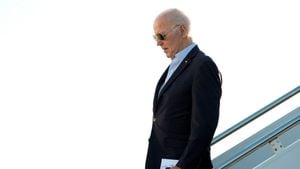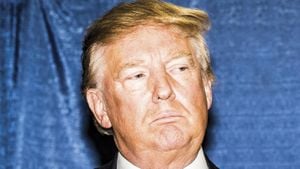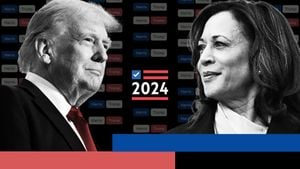Gautam Adani, one of the world’s most affluent businessmen and chairman of the Adani Group, finds himself at the center of monumental legal turmoil following charges of securities fraud and conspiracy involving alleged bribery and deception. A recent indictment, unsealed by U.S. federal prosecutors, accuses him and several associates of orchestrated efforts to mislead investors and facilitate corrupt practices, particularly related to substantial contracts for solar power projects within India.
At 62 years old, Adani has cultivated immense wealth and influence, positioning himself as the head of one of India's largest conglomerates. His company, Adani Green Energy Limited, allegedly attempted to secure investment by obscuring the true nature of its dealings with Indian government officials. The indictment specifies accusations of over $250 million being funneled as bribes to secure lucrative contracts, disguising the operation as legitimate solar energy initiatives.
Specifically, Adani and his co-defendants are charged with securities fraud related to their venture involving the sale of 12 gigawatts of solar energy to the Indian government. This amount is enough to power millions of homes and businesses across the subcontinent. The indictment outlines how they presented their operations to Wall Street investors as transparent and honest, all the time planning to enrich themselves through corrupt practices at the expense of American investors.
It’s revealed within the charges how conspirators utilized code names—referring to Adani as "Numero uno" and "the big man"—during their communications to discuss their clandestine activities. Alongside Adani, several executives from his companies and associated firms, including Sagar Adani—a nephew and executive director at Adani Green Energy—and Vneet Jaain, the former CEO of the company, are also implicated. The allegations detail how they manipulated their outward image to secure over $3 billion through loans and bonds, misleading lenders about the underlying corrupt practices.
“These defendants orchestrated elaborate schemes to enrich themselves at the expense of the integrity of our financial markets,” stated U.S. Attorney Breon Peace, emphasizing the breadth of the alleged wrongdoing. Another key figure from the indictment, Deputy Assistant Attorney General Lisa Miller, noted their ambition to “obtain and finance massive state energy supply contracts through corruption and fraud.”
The legal fallout doesn’t stop with the indictment alone; financial authorities also weigh heavily on Adani and his empire. The U.S. Securities and Exchange Commission (SEC) has filed civil actions against them, aiming to penalize the accused under various anti-fraud provisions, marking another layer to the mounting pressure from regulatory agencies.
Gautam Adani built his business empire starting from the coal sector back in the 1990s but diversified significantly over the years, plunging deep roots within India’s burgeoning renewable energy sector. The conglomerate's slogan, “Growth with Goodness,” has often been empty rhetoric for critics, particularly after accusations of corrupt dealings came to light through independent investigations, most prominently by Hindenburg Research. The firm labeled Adani's previous stock maneuvers as brazen manipulation alongside accounting fraud, allegations which Adani's team has roundly dismissed as malicious and baseless.
Recent events have sent shockwaves through international financial markets, evoking skepticism about governance structures across growing economies like India’s. Analysts worry how such widespread allegations could tarnish not only Adani's reputation but also broader investor confidence, especially as India positions itself as a future leader within the renewable energy domain.
This saga of corruption, fueled by high-stakes politics and business, transcends borders, tugging at the threads of U.S.-India economic relations. Adani’s ambitions to invest significantly—promising about $10 billion toward energy and infrastructure projects aimed to create thousands of jobs—now face scrutiny, as allegations question the very foundation of his business operations. Without strong legal representation or public statements to counter the narratives, the path forward remains rocky for the billionaire.
While India's political and financial landscapes await resolution, this case undoubtedly serves as a grim reminder for investors globally to be vigilant of potential misconduct hidden beneath glossy presentations and grand promises. The Adani Group’s future—and Gautam Adani’s legacy—now hang by the thread of impending judicial outcomes.



